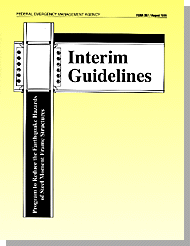|
|
Developments in Design and Construction Issues:
-
50 Percent Draft of Seismic Design Criteria:
After extensive technical investigations, a complete draft of the final design criteria
from the Phase 2 project is being made available for public review and comment. While these
recommendations are still preliminary (and in some cases erroneous), they outline the
intended direction to be taken in the final guideline documents and highlight many issues
which still require resolution. Forms are provided for reviewers to submit comments
directly to the SAC team of guideline writers.
-

Interim Guidelines (FEMA 267 / FEMA 267B):
Modified August 1999
The primary product of the Phase 1 Steel Project, this document provides
the most recent information on the evaluation, inspection, and repair of
existing steel moment frame structures as well as recommendations for the
design and construction of new steel buildings.
FEMA 267B, published August 1999,
is the second update to the original FEMA 267 document
and contains revised recommendations on numerous technical issues.
-
Connection Test Summaries : A total of
30 full-size beam-column tests were performed as part of the Phase 1 Steel
Project, and this document presents the results of these tests in a standardized
form to allow easy comparisons between various types of connections. Future
supplements to this document will include summaries of tests by researchers
and practicing engineers outside of the SAC Project, as well as all beam-column
tests performed under the Phase 2 Project.
-
Connection Database : The SAC Steel
Project is providing a database of 278 steel connection tests that have
been conducted since, or just prior to, the 1994 Northridge Earthquake.
Included in the 278 tests are Phase 1 tests that were summarized in the
report FEMA 289. This database has been developed and maintained
to assist professionals who are working with steel moment frames in the
absence of up-to-date codes and to facilitate the efforts of SAC Team Leaders
and Guideline Writers. Designers are cautioned not to draw detailed
conclusions from broad database results without reviewing original source
materials.
|

 Interim Guidelines (FEMA 267 / FEMA 267B):
Modified August 1999
The primary product of the Phase 1 Steel Project, this document provides
the most recent information on the evaluation, inspection, and repair of
existing steel moment frame structures as well as recommendations for the
design and construction of new steel buildings.
FEMA 267B, published August 1999,
is the second update to the original FEMA 267 document
and contains revised recommendations on numerous technical issues.
Interim Guidelines (FEMA 267 / FEMA 267B):
Modified August 1999
The primary product of the Phase 1 Steel Project, this document provides
the most recent information on the evaluation, inspection, and repair of
existing steel moment frame structures as well as recommendations for the
design and construction of new steel buildings.
FEMA 267B, published August 1999,
is the second update to the original FEMA 267 document
and contains revised recommendations on numerous technical issues.